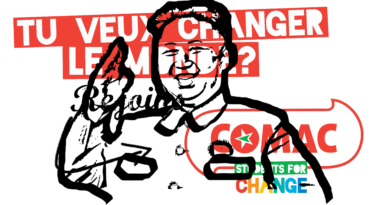The FN at the gates of power?
On a purely mathematical point of view, I do not think that the FN have any chance to win the next presidential elections. My argument rely only on calculation based on numbers. I do not enter the debate that tries to determine if it is good or bad to vote for the FN. Contrariwise my hypothesis stays valid if the context does not deteriorates. It seems obvious to me that if the terrorist attacks would carry on or the I.S., for example, would be able to put war on French territory, that would have a real impact on the radical right vote.
I use the term of radical right and not extreme, on a purely intellectual point of view. In that sense, I stay on the Mudde's path who estimates that these two definitions are completing themselves. They cannot be separated and we have to consider that the second is a subgroup of the first. That let him place this common points of nationalism and nativism for all those parties from the start as the minimal definition. The maximal one is a combinaison of fondamental characteristics of those parties, nativism, autoritarism and populism1.
At the last regional elections, France would have been scared with the rise of the FN as the "first" party... at the first round. With the help of a "republican burst", Marine Lepen's party did not have any region at the second round. What makes me laugh is that it's not the first party of France. Only by getting an eye on national results to be convinced: list Union de la Droite 40,24%, list Union de la Gauche 28,86% and the FN 27,10%. In fact, MLP did not succeed in a historic breakthrough, even if the score is a record.
On the opposite, in my opinion, we have to rely thoses results with the personal performances of the FN candidates in their regions: Marine Le Pen 42,34%, Marion Maréchal-Lepen 45,22%, Florian Philippot 36,05% for the first three. The radical party is under 10% only in Corsica. They are under 20% in Pays de la Loire, Britanny and Île de France. In 30 metropolitan regions 8 are above 30% of votes for the FN. In the second round, the FN wins 800.000 more voters than the former Sunday.
Although FN is everywhere, we see that it's the family business that attracts the voters. The branding works with the Le Pen ones, but elsewhere candidates are not standing out of the crowd even if their score are high. The Le Pen are at the gates of 50%. I even think that the FN lacks voice-catchingcharismatic candidates, without negative records if the party wants to carry on with ascension.
For the regions, 7 goes to right, 5 to the socialists and the Corsican regionalists win... Corsica. Let's have a look now on departments: 48 for the socialists and related, 43 for republicans and UDI, 7 for FN and 1 for Divers gauche (left). The map on the site of le Monde details that geographic level. The left electors are still mobilized at the second round even if they might be disappointed by the politics of the executive.
When I analyse this data, I keep my opinion that Marine Le Pen will not be the president after the next elections. I think that she will improve the score of the FN because her personality will mechanicaly attract new voters. As I'm not a futurologue, I will not bet on a score but certainly not 42%.2
Even if an election is not another, if I take the results of the first round, 40% of the voters will never vote for far right. Merely, the interest of the left situated candidates is to unite to reach the second round to be sure they will not do like Jospin. In fact, it's the huge risk that the left executive is taking now. Dividing the left side, by making right sided austerity politics, alienating EELV (the greens), the PS candidate takes the risk of not passing the cut.3
Now, it remains 60% to share between the right and Marine Le Pen's party. This is the key of the second round. If Sarkozy stays on his path, that will help the radical right: he still did not understand that the more he goes in that direction, the more voters are going to support MLP. For this theory, the former President should read Arzheimer's works.4, that would facilitate his task for his eventual return. Except if he does everything to be in front of her in the second round, but he needs to be certain that he will be in the second round...
In his place, I would not enter that tactic. If the "bleu marine" France is close to the 35%, it will remain 25%, his score of 2012, to share between the right sided parties. However during the first round, the Republicans are not the only ones on the right. I would give kind of the same advise to the socialist party: don't be certain that you'll be at the second round, because they have "only" 40% of the left electorate for the first round in which Hollande collected 28%.
In this configuration I really imagine Marine Le Pen in the second round, maybe even with the best score. Espacially if the 2 main parties are betting to be against her and beat her. It's a very risky bet, because even if I do not believe at all in it, the only possibility for the FN to win would be winning at the first round. That would mean that the FN has to pass from +-30% to more than 50%. For me the scenario of having the FN in the second round would be invalidated if Juppé wins the republican primaries. In that case I would bet on a traditional left VS right.5
In view of what I would call disenchantment of the French towards their elected officials, a move back to the greatness and sense of responsabilities should be the choice of these elected officials if they do not want to relive the experience of 2002: making left sided politics for the PS and Republicans should prepare next elections with a unifier centre right candidate and they could both block the FN. The cards are in the hands of the French leaders. We will see what they are going to do with them.
- MUDDE, Cas, « The War of Words: Defining the Extreme Right Party Family » in West
European Politics 19.2 (1996): 225-248 [↩] - She did 33,9% at the second round. [↩]
- That's exactly what happened. [↩]
- ARZHEIMER, Kai, « Contextual Factors and the Extreme Right Vote in Western Europe,
1980–2002 » in American Journal of Political Science, Vol. 53, No. 2, April 2009, p. 259-275. [↩] - I admit that I would take the return of DSK as very interesting even if it is almost as improbable than MLP president. [↩]



